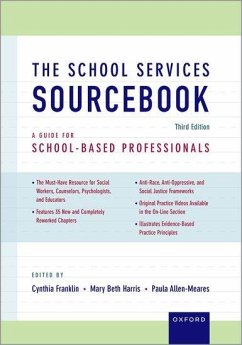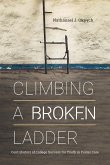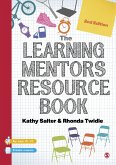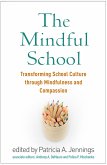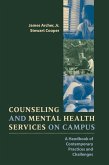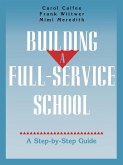The School Services Sourcebook
A Guide for School-Based Professionals
Herausgeber: Franklin, Cynthia
The School Services Sourcebook
A Guide for School-Based Professionals
Herausgeber: Franklin, Cynthia
- Gebundenes Buch
- Merkliste
- Auf die Merkliste
- Bewerten Bewerten
- Teilen
- Produkt teilen
- Produkterinnerung
- Produkterinnerung
A practical resource book for school social workers and mental health professionals. This third edition will appeal to practicing professionals in schools and become a popular textbook for graduate level students enrolled in school social work and school counselling courses.
Andere Kunden interessierten sich auch für
![Evidencing Cpd Evidencing Cpd]() Daisy BoggEvidencing Cpd172,99 €
Daisy BoggEvidencing Cpd172,99 €![Climbing a Broken Ladder Climbing a Broken Ladder]() Nathanael J OkpychClimbing a Broken Ladder157,99 €
Nathanael J OkpychClimbing a Broken Ladder157,99 €![The Learning Mentor′s Resource Book The Learning Mentor′s Resource Book]() Kathy HampsonThe Learning Mentor′s Resource Book175,99 €
Kathy HampsonThe Learning Mentor′s Resource Book175,99 €![Jhori's Journey Jhori's Journey]() Mackaria EstesJhori's Journey20,99 €
Mackaria EstesJhori's Journey20,99 €![The Mindful School The Mindful School]() The Mindful School61,99 €
The Mindful School61,99 €![Counseling and Mental Health Services on Campus Counseling and Mental Health Services on Campus]() James ArcherCounseling and Mental Health Services on Campus65,99 €
James ArcherCounseling and Mental Health Services on Campus65,99 €![Building a Full-Service School Building a Full-Service School]() Carol CalfeeBuilding a Full-Service School47,99 €
Carol CalfeeBuilding a Full-Service School47,99 €-
-
-
A practical resource book for school social workers and mental health professionals. This third edition will appeal to practicing professionals in schools and become a popular textbook for graduate level students enrolled in school social work and school counselling courses.
Hinweis: Dieser Artikel kann nur an eine deutsche Lieferadresse ausgeliefert werden.
Hinweis: Dieser Artikel kann nur an eine deutsche Lieferadresse ausgeliefert werden.
Produktdetails
- Produktdetails
- Verlag: Oxford University Press
- 3rd edition
- Seitenzahl: 880
- Erscheinungstermin: 29. März 2024
- Englisch
- Abmessung: 241mm x 175mm x 58mm
- Gewicht: 1746g
- ISBN-13: 9780197603413
- ISBN-10: 0197603416
- Artikelnr.: 67478983
- Herstellerkennzeichnung
- Libri GmbH
- Europaallee 1
- 36244 Bad Hersfeld
- gpsr@libri.de
- Verlag: Oxford University Press
- 3rd edition
- Seitenzahl: 880
- Erscheinungstermin: 29. März 2024
- Englisch
- Abmessung: 241mm x 175mm x 58mm
- Gewicht: 1746g
- ISBN-13: 9780197603413
- ISBN-10: 0197603416
- Artikelnr.: 67478983
- Herstellerkennzeichnung
- Libri GmbH
- Europaallee 1
- 36244 Bad Hersfeld
- gpsr@libri.de
Dr Cynthia Franklin, LCSW-S is the Stiernberg/Spencer Family Professor in Mental Health in the Steve Hicks School of Social Work at the University of Texas at Austin. Dr. Franklin is an international expert on solution focused brief therapy (SFBT) and school social work and school mental health services. Her career has been devoted to advances in practice and research on SFBT with the aim of preparing school social workers and other school mental health professionals for practice in schools. She was named one of the 100 most influential contemporary social work faculty (Journal of Social Service Research, 2019) and received the Gary Lee Shaffer award for academic contributions to the field of school social work. Dr. Mary Beth Harris is retired from the Suzanne Dworak-Peck School of Social Work at the University of Southern California where she directed campus-based and virtual programs in School Social Work. Prior to entering social work education in 2000, Harris was a family therapist, clinical director, and program administrator in the U.S.-Mexico border region for more than 20 years. Dr. Harris designed numerous courses across school social work and family practice curriculum. Her research and published works centered primarily around school social work and adolescent pregnancy. She developed Taking Charge, a widely implemented school-based life skills program for pregnant and parenting mothers. She subsequently co-authored a training manual with Dr. Cynthia Franklin for that program, Taking Charge: A School-Based Life Skills Group Curriculum for Adolescent Mothers, published by Oxford University Press. Dr. Paula Allen-Meares is an international expert on human services in educational settings, physical and mental health in under-resourced communities, and educational access and success. She served as Chancellor of University of Illinois at Chicago and Vice President of University of Illinois. Currently, she is John Corbally Presidential Professor Emerita and Professor of Medicine, College of Medicine, at the University of Illinois at Chicago. She also serves as Dean and Professor Emerita and the Norma Radin Collegiate Professor at the University of Michigan and previously served as Dean of the School Social Work at the University of Illinois at Urbana-Champaign.
* Preface
* Acknowledgments
* Contributors
* Part I: Roles and Context for Specialized Instructional Support
Personnel
* Section I: Frameworks and Ethics for Improving School Services
* 1. Roles of Different Professionals Within a Multitiered System of
Supports Framework
* Michael S. Kelly
* 2. Functional Behavioral Assessment
* Kevin J. Filter, Michelle E. Alvarez, and Kimberly A. Zammitt
* 3.Establishing an Ethical Practice in School Mental Health
* Nic Dibble and James Raines
* 4. Reflections on Implicit Bias
* G. Lawrence Farmer and Kandra Knowles
* 5. Social-Emotional Learning
* Aaron M. Thompson, Anna M. Kim, and Tanya Weigand
* 6. Collaboration With Teachers and Other School Professionals
* Annahita Ball
* 7. Promoting Mental Health and Well-Being
* Maria Hu and Stephen Hydon
* Part II: Trauma, Behavioral Health, and Neurodevelopmental
Interventions
* Section II: Trauma Practices and TraumaInformed Schools
* 8. Trauma-Responsive Practice in Schools
* Tory Cox and Meg A. Walkley
* 9. Students With Adverse Childhood Experiences
* Tara Powell and Jenna Muller
* 10. Students Who Have Experienced Trauma
* Cheryl Lanktree
* 11. Students Who Have Experienced Physical or Sexual Abuse
* Robert M. Ortega
* Section III: Behavioral Health and Neurodevelopmental Interventions
* 12. Mediating Mental Health Diagnoses in Schools Settings
* Susan Stone
* 13. Students With Disruptive Behavior Disorders
* Katherine L. Montgomery and Tammy Linseisen
* 14. Students With Anxiety Disorders
* Kristina Conroy, Christopher Georgiadis, and Jonathan S. Comer
* 15. Effective Interventions for Adolescents With Depression
* Jacqueline Corcoran
* 16. Suicide Assessment
* Hannah S. Szlyk and Courtney Hutchison
* 17. Suicide Prevention
* Jonathan B. Singer and Jessica Chock-Goldman
* 18. Students With Eating Disorders
* Sarah Mermelstein
* 19. Students With ADHD
* Martell L. Teasley and Bonita R. Teasley
* 20. Students With Autism Spectrum Disorder
* Michelle Ballan and Sarah Grosser
* 21. Substance Use Prevention and Intervention
* Audrey Hang Hai and Ai Bo
* 22. Contemporary Issues in Psychopharmacological Treatment for Child
and Adolescent Mental and Emotional Challenges
* Kia J. Bentley, Kathryn S. Collins, and Molly Chinoy
* Part III: School Engagement, Safety, and Dropout Prevention
* Section IV: School Engagement, Attendance, and Dropout Prevention
* 23. Expansive Ecological Model for Attendance and Engagement
Interventions
* Samantha Guz and Sireen Irsheid
* 24. Solution-Focused Brief Therapy for Students Who Are at Risk
* Cynthia Franklin, Katharine Sucher, Johnny Kim, and Stephen Tripodi
* 25. Resources and Programs for Pregnant and Parenting Students
* Mary Beth Harris
* Section V: Developing and Sustaining Safe Schools
* 26. School Safety and Climate in Evolving Contexts
* Rami Benbenishty and Ron Avi Astor
* 27. Current Approaches to School Safety: Integrating Resources,
Capacity, and Programs
* Heather M. Reynolds, Ron Avi Astor, Kate R. Watson, and Roxana
Marachi
* 28. Improving School Climate
* Gordon Capp and Ron Avi Astor
* 29. Multi-Tiered Trauma Focused Interventions for Safer Schools
* Marleen Wong, Vivien Villaverde, and Pamela Vona
* 30. School Disciplinary Practices and Staff-Student Relationships
* David R. Dupper
* 31. School Threat Assessment
* Dewey G. Cornell and Emily Warren
* 32. Gang-Involved Youth in Schools: A Comprehensive Approach to
Support
* Robert A. Hernandez, Lauren M. Garcia, and Margaret Y. W. Tam
* 33. Addressing and Preventing Bullying and Sexual Harassment in K-12
Schools
* Dorothy L. Espelage and Jun Sung Hong
* Part IV: Crisis Intervention, Group Work, and Parental and Family
Resources
* Section VI: Crisis Intervention Methods and Resources
* 34. A Solution-Focused Approach to Crisis Intervention
* Xiao Ding, Weiwen Zeng, Cynthia Franklin, and Jack Nowicki
* 35. Natural Disasters, Pandemics, and Other Crises
* Tara Powell and Karen Knox
* 36. School-Based Interventions Following Violent Crises
* Jun Sung Hong, Isak Kim, Jungup Lee, and Dorothy L. Espelage
* 37. Best Practice Grief Work With Students in the Schools
* Linda Goldman
* Section VII: Designing and Facilitating Groups in Schools
* 38. Groups With Adolescents
* Ondine Gros
* 39. Groups With Children: Promoting Social Competence
* Craig Winston LeCroy
* 40. Social Skills Groups: Helping Vulnerable Students With
Communication Skills
* Joan D. Landguth and Mary Beth Harris
* Section VIII: Parental Involvement and Family Resources
* 41. Strategies to Promote and Support Parent and Guardian Involvement
in Schools
* Hilary D. Joyce, Amber Lasseigne, Hilary Ward, Karen Sterling, and
Dawn Anderson-Butcher
* 42. Family Services in Schools: A Solution-Focused Approach
* Linda Metcalf
* 43. Supporting Students Experiencing Homelessness and Their Families
* Hadass Moore
* 44. Welcoming Crisis Migrants to School Communities
* Kerri Evans and Andrew Reynolds
* 45. Home Visits With Families
* Tiffany Gholson
* Part V: Best Practices for Race, Ethnicity, and Culture
* Section IX: Practice With Students and Families of Color and Other
Marginalized Groups
* 46. Defying the Legacy of Racialized Oppression in K-12 Education in
the 21st Century
* Terence D. Fitzgerald
* 47. Research and Intervention Practice on School-Based Mental Health
Services for Black Male Students
* James Green and Waldo E. Johnson Jr.
* 48. Working With First Nations Students and Families
* Dorie J. Gilbert and Jennifer L. Hopson
* 49. Latinx Students and Families and Refugees
* Jorge Delva, Dawn Belkin Martinez, and Rocio Calvo
* 50. Asian Students and Families
* Mo Yee Lee, Yitong Xin, Chang Liu, and Yao Wang
* 51. Working With Students of Diverse Sexual Orientations, Gender
Identities, and Gender Expressions
* Diane E. Elze
* Part VI: Accountability and Macro Practices in Schools
* Section X: Policy and Macro Interventions
* 52. Advocating for Evidence Informed Change With School Stakeholders
* Stacy A. Gherardi and Erica Warshawer
* 53. Evaluating Intervention and Program Effectiveness
* Beth Gerlach, Monica Faulkner, and Xiao Ding
* 54. Implementation Science in Schools
* Katherine L. Montgomery and Elizabeth Connors
* 55. Understanding and Accessing Public School Funding for Student
Support Services in the Post-Covid Context
* David Osher, Kelly Wells, Sophia Arredondo, and Melissa M. Chavez
* 56. Every Student Succeeds and Other Federal Policies
* Sarah Anne Eckert and John W. Sipple
* 57. Where Do We Go From Here? Mental Health and Evidence-Based
Practice
* Paula Allen-Meares and Katherine L. Montgomery
* Index
* Acknowledgments
* Contributors
* Part I: Roles and Context for Specialized Instructional Support
Personnel
* Section I: Frameworks and Ethics for Improving School Services
* 1. Roles of Different Professionals Within a Multitiered System of
Supports Framework
* Michael S. Kelly
* 2. Functional Behavioral Assessment
* Kevin J. Filter, Michelle E. Alvarez, and Kimberly A. Zammitt
* 3.Establishing an Ethical Practice in School Mental Health
* Nic Dibble and James Raines
* 4. Reflections on Implicit Bias
* G. Lawrence Farmer and Kandra Knowles
* 5. Social-Emotional Learning
* Aaron M. Thompson, Anna M. Kim, and Tanya Weigand
* 6. Collaboration With Teachers and Other School Professionals
* Annahita Ball
* 7. Promoting Mental Health and Well-Being
* Maria Hu and Stephen Hydon
* Part II: Trauma, Behavioral Health, and Neurodevelopmental
Interventions
* Section II: Trauma Practices and TraumaInformed Schools
* 8. Trauma-Responsive Practice in Schools
* Tory Cox and Meg A. Walkley
* 9. Students With Adverse Childhood Experiences
* Tara Powell and Jenna Muller
* 10. Students Who Have Experienced Trauma
* Cheryl Lanktree
* 11. Students Who Have Experienced Physical or Sexual Abuse
* Robert M. Ortega
* Section III: Behavioral Health and Neurodevelopmental Interventions
* 12. Mediating Mental Health Diagnoses in Schools Settings
* Susan Stone
* 13. Students With Disruptive Behavior Disorders
* Katherine L. Montgomery and Tammy Linseisen
* 14. Students With Anxiety Disorders
* Kristina Conroy, Christopher Georgiadis, and Jonathan S. Comer
* 15. Effective Interventions for Adolescents With Depression
* Jacqueline Corcoran
* 16. Suicide Assessment
* Hannah S. Szlyk and Courtney Hutchison
* 17. Suicide Prevention
* Jonathan B. Singer and Jessica Chock-Goldman
* 18. Students With Eating Disorders
* Sarah Mermelstein
* 19. Students With ADHD
* Martell L. Teasley and Bonita R. Teasley
* 20. Students With Autism Spectrum Disorder
* Michelle Ballan and Sarah Grosser
* 21. Substance Use Prevention and Intervention
* Audrey Hang Hai and Ai Bo
* 22. Contemporary Issues in Psychopharmacological Treatment for Child
and Adolescent Mental and Emotional Challenges
* Kia J. Bentley, Kathryn S. Collins, and Molly Chinoy
* Part III: School Engagement, Safety, and Dropout Prevention
* Section IV: School Engagement, Attendance, and Dropout Prevention
* 23. Expansive Ecological Model for Attendance and Engagement
Interventions
* Samantha Guz and Sireen Irsheid
* 24. Solution-Focused Brief Therapy for Students Who Are at Risk
* Cynthia Franklin, Katharine Sucher, Johnny Kim, and Stephen Tripodi
* 25. Resources and Programs for Pregnant and Parenting Students
* Mary Beth Harris
* Section V: Developing and Sustaining Safe Schools
* 26. School Safety and Climate in Evolving Contexts
* Rami Benbenishty and Ron Avi Astor
* 27. Current Approaches to School Safety: Integrating Resources,
Capacity, and Programs
* Heather M. Reynolds, Ron Avi Astor, Kate R. Watson, and Roxana
Marachi
* 28. Improving School Climate
* Gordon Capp and Ron Avi Astor
* 29. Multi-Tiered Trauma Focused Interventions for Safer Schools
* Marleen Wong, Vivien Villaverde, and Pamela Vona
* 30. School Disciplinary Practices and Staff-Student Relationships
* David R. Dupper
* 31. School Threat Assessment
* Dewey G. Cornell and Emily Warren
* 32. Gang-Involved Youth in Schools: A Comprehensive Approach to
Support
* Robert A. Hernandez, Lauren M. Garcia, and Margaret Y. W. Tam
* 33. Addressing and Preventing Bullying and Sexual Harassment in K-12
Schools
* Dorothy L. Espelage and Jun Sung Hong
* Part IV: Crisis Intervention, Group Work, and Parental and Family
Resources
* Section VI: Crisis Intervention Methods and Resources
* 34. A Solution-Focused Approach to Crisis Intervention
* Xiao Ding, Weiwen Zeng, Cynthia Franklin, and Jack Nowicki
* 35. Natural Disasters, Pandemics, and Other Crises
* Tara Powell and Karen Knox
* 36. School-Based Interventions Following Violent Crises
* Jun Sung Hong, Isak Kim, Jungup Lee, and Dorothy L. Espelage
* 37. Best Practice Grief Work With Students in the Schools
* Linda Goldman
* Section VII: Designing and Facilitating Groups in Schools
* 38. Groups With Adolescents
* Ondine Gros
* 39. Groups With Children: Promoting Social Competence
* Craig Winston LeCroy
* 40. Social Skills Groups: Helping Vulnerable Students With
Communication Skills
* Joan D. Landguth and Mary Beth Harris
* Section VIII: Parental Involvement and Family Resources
* 41. Strategies to Promote and Support Parent and Guardian Involvement
in Schools
* Hilary D. Joyce, Amber Lasseigne, Hilary Ward, Karen Sterling, and
Dawn Anderson-Butcher
* 42. Family Services in Schools: A Solution-Focused Approach
* Linda Metcalf
* 43. Supporting Students Experiencing Homelessness and Their Families
* Hadass Moore
* 44. Welcoming Crisis Migrants to School Communities
* Kerri Evans and Andrew Reynolds
* 45. Home Visits With Families
* Tiffany Gholson
* Part V: Best Practices for Race, Ethnicity, and Culture
* Section IX: Practice With Students and Families of Color and Other
Marginalized Groups
* 46. Defying the Legacy of Racialized Oppression in K-12 Education in
the 21st Century
* Terence D. Fitzgerald
* 47. Research and Intervention Practice on School-Based Mental Health
Services for Black Male Students
* James Green and Waldo E. Johnson Jr.
* 48. Working With First Nations Students and Families
* Dorie J. Gilbert and Jennifer L. Hopson
* 49. Latinx Students and Families and Refugees
* Jorge Delva, Dawn Belkin Martinez, and Rocio Calvo
* 50. Asian Students and Families
* Mo Yee Lee, Yitong Xin, Chang Liu, and Yao Wang
* 51. Working With Students of Diverse Sexual Orientations, Gender
Identities, and Gender Expressions
* Diane E. Elze
* Part VI: Accountability and Macro Practices in Schools
* Section X: Policy and Macro Interventions
* 52. Advocating for Evidence Informed Change With School Stakeholders
* Stacy A. Gherardi and Erica Warshawer
* 53. Evaluating Intervention and Program Effectiveness
* Beth Gerlach, Monica Faulkner, and Xiao Ding
* 54. Implementation Science in Schools
* Katherine L. Montgomery and Elizabeth Connors
* 55. Understanding and Accessing Public School Funding for Student
Support Services in the Post-Covid Context
* David Osher, Kelly Wells, Sophia Arredondo, and Melissa M. Chavez
* 56. Every Student Succeeds and Other Federal Policies
* Sarah Anne Eckert and John W. Sipple
* 57. Where Do We Go From Here? Mental Health and Evidence-Based
Practice
* Paula Allen-Meares and Katherine L. Montgomery
* Index
* Preface
* Acknowledgments
* Contributors
* Part I: Roles and Context for Specialized Instructional Support
Personnel
* Section I: Frameworks and Ethics for Improving School Services
* 1. Roles of Different Professionals Within a Multitiered System of
Supports Framework
* Michael S. Kelly
* 2. Functional Behavioral Assessment
* Kevin J. Filter, Michelle E. Alvarez, and Kimberly A. Zammitt
* 3.Establishing an Ethical Practice in School Mental Health
* Nic Dibble and James Raines
* 4. Reflections on Implicit Bias
* G. Lawrence Farmer and Kandra Knowles
* 5. Social-Emotional Learning
* Aaron M. Thompson, Anna M. Kim, and Tanya Weigand
* 6. Collaboration With Teachers and Other School Professionals
* Annahita Ball
* 7. Promoting Mental Health and Well-Being
* Maria Hu and Stephen Hydon
* Part II: Trauma, Behavioral Health, and Neurodevelopmental
Interventions
* Section II: Trauma Practices and TraumaInformed Schools
* 8. Trauma-Responsive Practice in Schools
* Tory Cox and Meg A. Walkley
* 9. Students With Adverse Childhood Experiences
* Tara Powell and Jenna Muller
* 10. Students Who Have Experienced Trauma
* Cheryl Lanktree
* 11. Students Who Have Experienced Physical or Sexual Abuse
* Robert M. Ortega
* Section III: Behavioral Health and Neurodevelopmental Interventions
* 12. Mediating Mental Health Diagnoses in Schools Settings
* Susan Stone
* 13. Students With Disruptive Behavior Disorders
* Katherine L. Montgomery and Tammy Linseisen
* 14. Students With Anxiety Disorders
* Kristina Conroy, Christopher Georgiadis, and Jonathan S. Comer
* 15. Effective Interventions for Adolescents With Depression
* Jacqueline Corcoran
* 16. Suicide Assessment
* Hannah S. Szlyk and Courtney Hutchison
* 17. Suicide Prevention
* Jonathan B. Singer and Jessica Chock-Goldman
* 18. Students With Eating Disorders
* Sarah Mermelstein
* 19. Students With ADHD
* Martell L. Teasley and Bonita R. Teasley
* 20. Students With Autism Spectrum Disorder
* Michelle Ballan and Sarah Grosser
* 21. Substance Use Prevention and Intervention
* Audrey Hang Hai and Ai Bo
* 22. Contemporary Issues in Psychopharmacological Treatment for Child
and Adolescent Mental and Emotional Challenges
* Kia J. Bentley, Kathryn S. Collins, and Molly Chinoy
* Part III: School Engagement, Safety, and Dropout Prevention
* Section IV: School Engagement, Attendance, and Dropout Prevention
* 23. Expansive Ecological Model for Attendance and Engagement
Interventions
* Samantha Guz and Sireen Irsheid
* 24. Solution-Focused Brief Therapy for Students Who Are at Risk
* Cynthia Franklin, Katharine Sucher, Johnny Kim, and Stephen Tripodi
* 25. Resources and Programs for Pregnant and Parenting Students
* Mary Beth Harris
* Section V: Developing and Sustaining Safe Schools
* 26. School Safety and Climate in Evolving Contexts
* Rami Benbenishty and Ron Avi Astor
* 27. Current Approaches to School Safety: Integrating Resources,
Capacity, and Programs
* Heather M. Reynolds, Ron Avi Astor, Kate R. Watson, and Roxana
Marachi
* 28. Improving School Climate
* Gordon Capp and Ron Avi Astor
* 29. Multi-Tiered Trauma Focused Interventions for Safer Schools
* Marleen Wong, Vivien Villaverde, and Pamela Vona
* 30. School Disciplinary Practices and Staff-Student Relationships
* David R. Dupper
* 31. School Threat Assessment
* Dewey G. Cornell and Emily Warren
* 32. Gang-Involved Youth in Schools: A Comprehensive Approach to
Support
* Robert A. Hernandez, Lauren M. Garcia, and Margaret Y. W. Tam
* 33. Addressing and Preventing Bullying and Sexual Harassment in K-12
Schools
* Dorothy L. Espelage and Jun Sung Hong
* Part IV: Crisis Intervention, Group Work, and Parental and Family
Resources
* Section VI: Crisis Intervention Methods and Resources
* 34. A Solution-Focused Approach to Crisis Intervention
* Xiao Ding, Weiwen Zeng, Cynthia Franklin, and Jack Nowicki
* 35. Natural Disasters, Pandemics, and Other Crises
* Tara Powell and Karen Knox
* 36. School-Based Interventions Following Violent Crises
* Jun Sung Hong, Isak Kim, Jungup Lee, and Dorothy L. Espelage
* 37. Best Practice Grief Work With Students in the Schools
* Linda Goldman
* Section VII: Designing and Facilitating Groups in Schools
* 38. Groups With Adolescents
* Ondine Gros
* 39. Groups With Children: Promoting Social Competence
* Craig Winston LeCroy
* 40. Social Skills Groups: Helping Vulnerable Students With
Communication Skills
* Joan D. Landguth and Mary Beth Harris
* Section VIII: Parental Involvement and Family Resources
* 41. Strategies to Promote and Support Parent and Guardian Involvement
in Schools
* Hilary D. Joyce, Amber Lasseigne, Hilary Ward, Karen Sterling, and
Dawn Anderson-Butcher
* 42. Family Services in Schools: A Solution-Focused Approach
* Linda Metcalf
* 43. Supporting Students Experiencing Homelessness and Their Families
* Hadass Moore
* 44. Welcoming Crisis Migrants to School Communities
* Kerri Evans and Andrew Reynolds
* 45. Home Visits With Families
* Tiffany Gholson
* Part V: Best Practices for Race, Ethnicity, and Culture
* Section IX: Practice With Students and Families of Color and Other
Marginalized Groups
* 46. Defying the Legacy of Racialized Oppression in K-12 Education in
the 21st Century
* Terence D. Fitzgerald
* 47. Research and Intervention Practice on School-Based Mental Health
Services for Black Male Students
* James Green and Waldo E. Johnson Jr.
* 48. Working With First Nations Students and Families
* Dorie J. Gilbert and Jennifer L. Hopson
* 49. Latinx Students and Families and Refugees
* Jorge Delva, Dawn Belkin Martinez, and Rocio Calvo
* 50. Asian Students and Families
* Mo Yee Lee, Yitong Xin, Chang Liu, and Yao Wang
* 51. Working With Students of Diverse Sexual Orientations, Gender
Identities, and Gender Expressions
* Diane E. Elze
* Part VI: Accountability and Macro Practices in Schools
* Section X: Policy and Macro Interventions
* 52. Advocating for Evidence Informed Change With School Stakeholders
* Stacy A. Gherardi and Erica Warshawer
* 53. Evaluating Intervention and Program Effectiveness
* Beth Gerlach, Monica Faulkner, and Xiao Ding
* 54. Implementation Science in Schools
* Katherine L. Montgomery and Elizabeth Connors
* 55. Understanding and Accessing Public School Funding for Student
Support Services in the Post-Covid Context
* David Osher, Kelly Wells, Sophia Arredondo, and Melissa M. Chavez
* 56. Every Student Succeeds and Other Federal Policies
* Sarah Anne Eckert and John W. Sipple
* 57. Where Do We Go From Here? Mental Health and Evidence-Based
Practice
* Paula Allen-Meares and Katherine L. Montgomery
* Index
* Acknowledgments
* Contributors
* Part I: Roles and Context for Specialized Instructional Support
Personnel
* Section I: Frameworks and Ethics for Improving School Services
* 1. Roles of Different Professionals Within a Multitiered System of
Supports Framework
* Michael S. Kelly
* 2. Functional Behavioral Assessment
* Kevin J. Filter, Michelle E. Alvarez, and Kimberly A. Zammitt
* 3.Establishing an Ethical Practice in School Mental Health
* Nic Dibble and James Raines
* 4. Reflections on Implicit Bias
* G. Lawrence Farmer and Kandra Knowles
* 5. Social-Emotional Learning
* Aaron M. Thompson, Anna M. Kim, and Tanya Weigand
* 6. Collaboration With Teachers and Other School Professionals
* Annahita Ball
* 7. Promoting Mental Health and Well-Being
* Maria Hu and Stephen Hydon
* Part II: Trauma, Behavioral Health, and Neurodevelopmental
Interventions
* Section II: Trauma Practices and TraumaInformed Schools
* 8. Trauma-Responsive Practice in Schools
* Tory Cox and Meg A. Walkley
* 9. Students With Adverse Childhood Experiences
* Tara Powell and Jenna Muller
* 10. Students Who Have Experienced Trauma
* Cheryl Lanktree
* 11. Students Who Have Experienced Physical or Sexual Abuse
* Robert M. Ortega
* Section III: Behavioral Health and Neurodevelopmental Interventions
* 12. Mediating Mental Health Diagnoses in Schools Settings
* Susan Stone
* 13. Students With Disruptive Behavior Disorders
* Katherine L. Montgomery and Tammy Linseisen
* 14. Students With Anxiety Disorders
* Kristina Conroy, Christopher Georgiadis, and Jonathan S. Comer
* 15. Effective Interventions for Adolescents With Depression
* Jacqueline Corcoran
* 16. Suicide Assessment
* Hannah S. Szlyk and Courtney Hutchison
* 17. Suicide Prevention
* Jonathan B. Singer and Jessica Chock-Goldman
* 18. Students With Eating Disorders
* Sarah Mermelstein
* 19. Students With ADHD
* Martell L. Teasley and Bonita R. Teasley
* 20. Students With Autism Spectrum Disorder
* Michelle Ballan and Sarah Grosser
* 21. Substance Use Prevention and Intervention
* Audrey Hang Hai and Ai Bo
* 22. Contemporary Issues in Psychopharmacological Treatment for Child
and Adolescent Mental and Emotional Challenges
* Kia J. Bentley, Kathryn S. Collins, and Molly Chinoy
* Part III: School Engagement, Safety, and Dropout Prevention
* Section IV: School Engagement, Attendance, and Dropout Prevention
* 23. Expansive Ecological Model for Attendance and Engagement
Interventions
* Samantha Guz and Sireen Irsheid
* 24. Solution-Focused Brief Therapy for Students Who Are at Risk
* Cynthia Franklin, Katharine Sucher, Johnny Kim, and Stephen Tripodi
* 25. Resources and Programs for Pregnant and Parenting Students
* Mary Beth Harris
* Section V: Developing and Sustaining Safe Schools
* 26. School Safety and Climate in Evolving Contexts
* Rami Benbenishty and Ron Avi Astor
* 27. Current Approaches to School Safety: Integrating Resources,
Capacity, and Programs
* Heather M. Reynolds, Ron Avi Astor, Kate R. Watson, and Roxana
Marachi
* 28. Improving School Climate
* Gordon Capp and Ron Avi Astor
* 29. Multi-Tiered Trauma Focused Interventions for Safer Schools
* Marleen Wong, Vivien Villaverde, and Pamela Vona
* 30. School Disciplinary Practices and Staff-Student Relationships
* David R. Dupper
* 31. School Threat Assessment
* Dewey G. Cornell and Emily Warren
* 32. Gang-Involved Youth in Schools: A Comprehensive Approach to
Support
* Robert A. Hernandez, Lauren M. Garcia, and Margaret Y. W. Tam
* 33. Addressing and Preventing Bullying and Sexual Harassment in K-12
Schools
* Dorothy L. Espelage and Jun Sung Hong
* Part IV: Crisis Intervention, Group Work, and Parental and Family
Resources
* Section VI: Crisis Intervention Methods and Resources
* 34. A Solution-Focused Approach to Crisis Intervention
* Xiao Ding, Weiwen Zeng, Cynthia Franklin, and Jack Nowicki
* 35. Natural Disasters, Pandemics, and Other Crises
* Tara Powell and Karen Knox
* 36. School-Based Interventions Following Violent Crises
* Jun Sung Hong, Isak Kim, Jungup Lee, and Dorothy L. Espelage
* 37. Best Practice Grief Work With Students in the Schools
* Linda Goldman
* Section VII: Designing and Facilitating Groups in Schools
* 38. Groups With Adolescents
* Ondine Gros
* 39. Groups With Children: Promoting Social Competence
* Craig Winston LeCroy
* 40. Social Skills Groups: Helping Vulnerable Students With
Communication Skills
* Joan D. Landguth and Mary Beth Harris
* Section VIII: Parental Involvement and Family Resources
* 41. Strategies to Promote and Support Parent and Guardian Involvement
in Schools
* Hilary D. Joyce, Amber Lasseigne, Hilary Ward, Karen Sterling, and
Dawn Anderson-Butcher
* 42. Family Services in Schools: A Solution-Focused Approach
* Linda Metcalf
* 43. Supporting Students Experiencing Homelessness and Their Families
* Hadass Moore
* 44. Welcoming Crisis Migrants to School Communities
* Kerri Evans and Andrew Reynolds
* 45. Home Visits With Families
* Tiffany Gholson
* Part V: Best Practices for Race, Ethnicity, and Culture
* Section IX: Practice With Students and Families of Color and Other
Marginalized Groups
* 46. Defying the Legacy of Racialized Oppression in K-12 Education in
the 21st Century
* Terence D. Fitzgerald
* 47. Research and Intervention Practice on School-Based Mental Health
Services for Black Male Students
* James Green and Waldo E. Johnson Jr.
* 48. Working With First Nations Students and Families
* Dorie J. Gilbert and Jennifer L. Hopson
* 49. Latinx Students and Families and Refugees
* Jorge Delva, Dawn Belkin Martinez, and Rocio Calvo
* 50. Asian Students and Families
* Mo Yee Lee, Yitong Xin, Chang Liu, and Yao Wang
* 51. Working With Students of Diverse Sexual Orientations, Gender
Identities, and Gender Expressions
* Diane E. Elze
* Part VI: Accountability and Macro Practices in Schools
* Section X: Policy and Macro Interventions
* 52. Advocating for Evidence Informed Change With School Stakeholders
* Stacy A. Gherardi and Erica Warshawer
* 53. Evaluating Intervention and Program Effectiveness
* Beth Gerlach, Monica Faulkner, and Xiao Ding
* 54. Implementation Science in Schools
* Katherine L. Montgomery and Elizabeth Connors
* 55. Understanding and Accessing Public School Funding for Student
Support Services in the Post-Covid Context
* David Osher, Kelly Wells, Sophia Arredondo, and Melissa M. Chavez
* 56. Every Student Succeeds and Other Federal Policies
* Sarah Anne Eckert and John W. Sipple
* 57. Where Do We Go From Here? Mental Health and Evidence-Based
Practice
* Paula Allen-Meares and Katherine L. Montgomery
* Index

